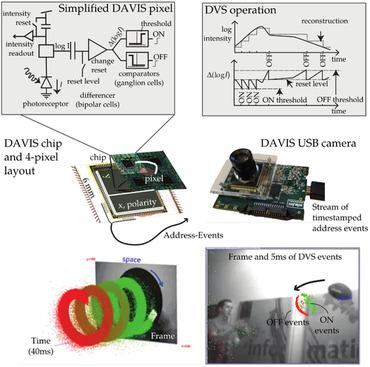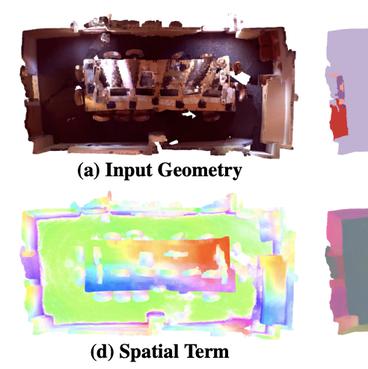Search Results for author: Yueyi Zhang
Found 25 papers, 17 papers with code
Spatial Hierarchy Aware Residual Pyramid Network for Time-of-Flight Depth Denoising
1 code implementation • ECCV 2020 • Guanting Dong, Yueyi Zhang, Zhiwei Xiong
In this paper, we propose a Spatial Hierarchy Aware Residual Pyramid Network, called SHARP-Net, to remove the depth noise by fully exploiting the geometry information of the scene on different scales.
Scene Adaptive Sparse Transformer for Event-based Object Detection
1 code implementation • 2 Apr 2024 • Yansong Peng, Hebei Li, Yueyi Zhang, Xiaoyan Sun, Feng Wu
However, they display inadequate sparsity and adaptability when applied to event-based object detection, since these approaches cannot balance the fine granularity of token-level sparsification and the efficiency of window-based Transformers, leading to reduced performance and efficiency.
Event-assisted Low-Light Video Object Segmentation
no code implementations • 2 Apr 2024 • Hebei Li, Jin Wang, Jiahui Yuan, Yue Li, Wenming Weng, Yansong Peng, Yueyi Zhang, Zhiwei Xiong, Xiaoyan Sun
In the realm of video object segmentation (VOS), the challenge of operating under low-light conditions persists, resulting in notably degraded image quality and compromised accuracy when comparing query and memory frames for similarity computation.
Graph Relation Distillation for Efficient Biomedical Instance Segmentation
2 code implementations • 12 Jan 2024 • Xiaoyu Liu, Yueyi Zhang, Zhiwei Xiong, Wei Huang, Bo Hu, Xiaoyan Sun, Feng Wu
IGD constructs a graph representing instance features and relations, transferring these two types of knowledge by enforcing instance graph consistency.
ART$\boldsymbol{\cdot}$V: Auto-Regressive Text-to-Video Generation with Diffusion Models
no code implementations • 30 Nov 2023 • Wenming Weng, Ruoyu Feng, Yanhui Wang, Qi Dai, Chunyu Wang, Dacheng Yin, Zhiyuan Zhao, Kai Qiu, Jianmin Bao, Yuhui Yuan, Chong Luo, Yueyi Zhang, Zhiwei Xiong
Second, it preserves the high-fidelity generation ability of the pre-trained image diffusion models by making only minimal network modifications.
GET: Group Event Transformer for Event-Based Vision
1 code implementation • ICCV 2023 • Yansong Peng, Yueyi Zhang, Zhiwei Xiong, Xiaoyan Sun, Feng Wu
Event cameras are a type of novel neuromorphic sen-sor that has been gaining increasing attention.
EGVD: Event-Guided Video Deraining
1 code implementation • 29 Sep 2023 • Yueyi Zhang, Jin Wang, Wenming Weng, Xiaoyan Sun, Zhiwei Xiong
In this paper, we approach video deraining by employing an event camera.
Domain Adaptive Synapse Detection with Weak Point Annotations
no code implementations • 31 Aug 2023 • Qi Chen, Wei Huang, Yueyi Zhang, Zhiwei Xiong
In the second stage, we improve model generalizability on target data by regenerating square masks to get high-quality pseudo labels.
Deep Multi-Threshold Spiking-UNet for Image Processing
1 code implementation • 20 Jul 2023 • Hebei Li, Yueyi Zhang, Zhiwei Xiong, Xiaoyan Sun
Furthermore, we adopt a flow-based training method to fine-tune the converted models, reducing time steps while preserving performance.
Toward Real-World Light Field Super-Resolution
1 code implementation • 30 May 2023 • Zeyu Xiao, Ruisheng Gao, Yutong Liu, Yueyi Zhang, Zhiwei Xiong
Deep learning has opened up new possibilities for light field super-resolution (SR), but existing methods trained on synthetic datasets with simple degradations (e. g., bicubic downsampling) suffer from poor performance when applied to complex real-world scenarios.
Image Captioning with Multi-Context Synthetic Data
no code implementations • 29 May 2023 • Feipeng Ma, Yizhou Zhou, Fengyun Rao, Yueyi Zhang, Xiaoyan Sun
This potential can be harnessed to create synthetic image-text pairs for training captioning models.
Unsupervised Video Deraining with An Event Camera
1 code implementation • ICCV 2023 • Jin Wang, Wenming Weng, Yueyi Zhang, Zhiwei Xiong
Current unsupervised video deraining methods are inefficient in modeling the intricate spatio-temporal properties of rain, which leads to unsatisfactory results.
Learning Cross-Representation Affinity Consistency for Sparsely Supervised Biomedical Instance Segmentation
1 code implementation • ICCV 2023 • Xiaoyu Liu, Wei Huang, Zhiwei Xiong, Shenglong Zhou, Yueyi Zhang, Xuejin Chen, Zheng-Jun Zha, Feng Wu
Sparse instance-level supervision has recently been explored to address insufficient annotation in biomedical instance segmentation, which is easier to annotate crowded instances and better preserves instance completeness for 3D volumetric datasets compared to common semi-supervision. In this paper, we propose a sparsely supervised biomedical instance segmentation framework via cross-representation affinity consistency regularization.
A Soma Segmentation Benchmark in Full Adult Fly Brain
1 code implementation • CVPR 2023 • Xiaoyu Liu, Bo Hu, Mingxing Li, Wei Huang, Yueyi Zhang, Zhiwei Xiong
Finally, we provide quantitative and qualitative benchmark comparisons on the testset to validate the superiority of the proposed method, as well as preliminary statistics of the reconstructed somas in the full adult fly brain from the biological perspective.
NLOST: Non-Line-of-Sight Imaging With Transformer
no code implementations • CVPR 2023 • Yue Li, Jiayong Peng, Juntian Ye, Yueyi Zhang, Feihu Xu, Zhiwei Xiong
Specifically, after extracting the shallow features with the assistance of physics-based priors, we design two spatial-temporal self attention encoders to explore both local and global correlations within 3D NLOS data by splitting or downsampling the features into different scales, respectively.
Depth Estimation From Indoor Panoramas With Neural Scene Representation
1 code implementation • CVPR 2023 • Wenjie Chang, Yueyi Zhang, Zhiwei Xiong
Depth estimation from indoor panoramas is challenging due to the equirectangular distortions of panoramas and inaccurate matching.
Progressive Spatio-Temporal Alignment for Efficient Event-Based Motion Estimation
1 code implementation • CVPR 2023 • Xueyan Huang, Yueyi Zhang, Zhiwei Xiong
In addition, a dynamic batch size strategy is applied to adaptively adjust the batch size so that all events in the batch are consistent with the current motion model.
Event-Based Blurry Frame Interpolation Under Blind Exposure
1 code implementation • CVPR 2023 • Wenming Weng, Yueyi Zhang, Zhiwei Xiong
Therefore, we first propose an exposure estimation strategy guided by event streams to estimate the lost exposure prior, transforming the blind exposure problem well-posed.
Degradation-agnostic Correspondence from Resolution-asymmetric Stereo
no code implementations • CVPR 2022 • Xihao Chen, Zhiwei Xiong, Zhen Cheng, Jiayong Peng, Yueyi Zhang, Zheng-Jun Zha
Interestingly, we find that, although a stereo matching network trained with the photometric loss is not optimal, its feature extractor can produce degradation-agnostic and matching-specific features.
Retinal Vessel Segmentation with Pixel-wise Adaptive Filters
1 code implementation • 3 Feb 2022 • Mingxing Li, Shenglong Zhou, Chang Chen, Yueyi Zhang, Dong Liu, Zhiwei Xiong
Accurate retinal vessel segmentation is challenging because of the complex texture of retinal vessels and low imaging contrast.
Exploiting Rigidity Constraints for LiDAR Scene Flow Estimation
no code implementations • CVPR 2022 • Guanting Dong, Yueyi Zhang, HanLin Li, Xiaoyan Sun, Zhiwei Xiong
Previous LiDAR scene flow estimation methods, especially recurrent neural networks, usually suffer from structure distortion in challenging cases, such as sparse reflection and motion occlusions.
EDPN: Enhanced Deep Pyramid Network for Blurry Image Restoration
1 code implementation • 11 May 2021 • Ruikang Xu, Zeyu Xiao, Jie Huang, Yueyi Zhang, Zhiwei Xiong
Image deblurring has seen a great improvement with the development of deep neural networks.
Advanced Deep Networks for 3D Mitochondria Instance Segmentation
1 code implementation • 16 Apr 2021 • Mingxing Li, Chang Chen, Xiaoyu Liu, Wei Huang, Yueyi Zhang, Zhiwei Xiong
Mitochondria instance segmentation from electron microscopy (EM) images has seen notable progress since the introduction of deep learning methods.
 Ranked #1 on
3D Instance Segmentation
on MitoEM
Ranked #1 on
3D Instance Segmentation
on MitoEM
Event-Based Video Reconstruction Using Transformer
1 code implementation • ICCV 2021 • Wenming Weng, Yueyi Zhang, Zhiwei Xiong
Event cameras, which output events by detecting spatio-temporal brightness changes, bring a novel paradigm to image sensors with high dynamic range and low latency.
 Ranked #2 on
Event-based Object Segmentation
on DSEC-SEG
Ranked #2 on
Event-based Object Segmentation
on DSEC-SEG
 Event-based Object Segmentation
Event-based Object Segmentation
 Event-Based Video Reconstruction
+1
Event-Based Video Reconstruction
+1
Depth Acquisition from Density Modulated Binary Patterns
no code implementations • CVPR 2013 • Zhe Yang, Zhiwei Xiong, Yueyi Zhang, Jiao Wang, Feng Wu
First, we propose an algorithm to design the patterns to carry more phase information without compromising the depth reconstruction from a single captured image as with Kinect.














